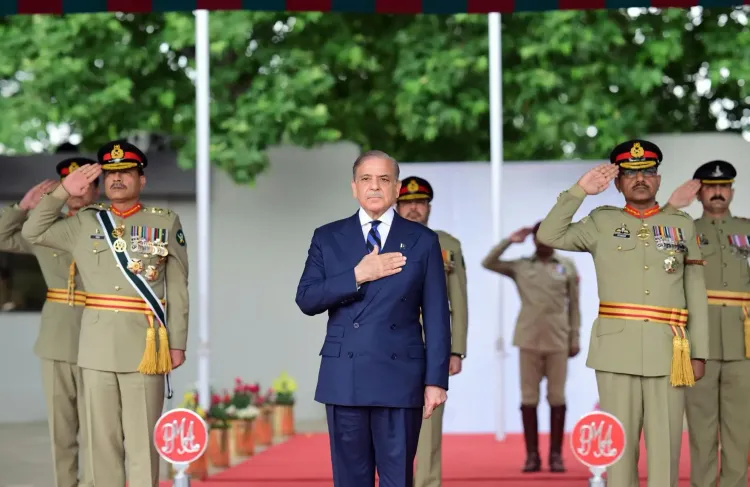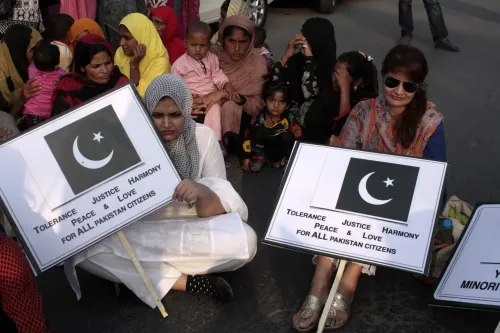Is Pakistan Ignoring Its Traditional Fault Lines Amid Internal Uprisings?

Synopsis
Key Takeaways
- Pakistan's internal unrest is escalating amid geopolitical ambitions.
- PoK residents are protesting against human rights violations.
- Balochistan faces threats from the BLA and local grievances.
- India must recalibrate its Afghan strategy in light of these developments.
- Regional cooperation is vital for stability.
Islamabad, Oct 16 (NationPress) - Pakistan, feeling a resurgence in its regional geopolitical significance with the endorsement of US President Donald Trump, has seemingly chosen to overlook its numerous traditional fault lines that are intensifying alongside rising internal strife, as reported on Thursday.
Pakistan-occupied Kashmir (PoK) has been enduring persistent unrest due to Pakistan's human rights violations and the neglect of local inhabitants, with the turmoil in PoJK escalating to alarming levels in recent months, as highlighted in an opinion piece by The Asian Age. Pakistan's harsh measures against PoK residents have led to the deaths of dozens, including police and security personnel.
In the words of Lieutenant-General (Retd.) Kamal Davar, who previously led India’s Defence Intelligence Agency, "It is clear that Pakistan perceives a revival in its regional geopolitical status with Mr. Trump’s endorsements, especially following a defense pact with Saudi Arabia and Mr. Sharif's recognition by the US President at the Sharm el-Sheikh peace conference on Gaza. However, Islamabad conveniently forgets its numerous traditional fault lines that are escalating with emerging internal uprisings."
Furthermore, Lashkar-e-Tayyaba (LeT) and Jaish-e-Mohammed (JeM) have relocated their terrorist bases from PoK to Pakistan’s Khyber Pakhtunkhwa province, particularly following Operation Sindoor, where Indian forces dismantled nine terrorist hubs in retaliation for the April 22 Pahalgam attack.
"The terrorist factions seem to have lost confidence in the ability of the Pakistan Army to safeguard them in PoK, leading to their decision to transfer their camps. The ongoing protests in PoK are tied to the social, political, and economic interests of the local populace. Additionally, the exploitation of PoK's natural resources and the absence of an international airport at Mirpur are significant grievances. Administrative decisions for PoK are exclusively made by a council led by the Pakistan PM, with no local representation from PoK. Current protests have intensified, engaging women and students across major towns in PoK," Lt. Gen. Davar emphasized in The Asian Age.
The situation in Balochistan poses a serious threat to Pakistan's political stability, as the Baloch Liberation Army (BLA) conducts frequent attacks on trains, buses, and military convoys, inflicting considerable damage. Baloch residents oppose the China-Pakistan Economic Corridor (CPEC) and the development of Gwadar port, feeling that their resources and land are being exploited without compensation.
"The Baloch insurgency is reaching unprecedented levels, with the BLA employing new strategies, including sophisticated weaponry and the recruitment of female suicide bombers. Pakistan has been systematically conducting genocide against the Baloch people. Reports from reliable media and intelligence sources indicate that Pakistan has formed an alliance between LeT and the global terror group ISKP, orchestrated by the Inter-Services Intelligence," the author detailed.
Simultaneously, violence has escalated in Khyber Pakhtunkhwa as the Tehreek-e-Taliban Pakistan (TTP) and smaller factions frequently target the Pakistan Army and governmental resources. Recently, Pakistan's Peshawar corps commander disclosed that 917 terrorists, 303 soldiers, 73 police officers, and 132 civilians have lost their lives in Khyber Pakhtunkhwa as of September 15 this year. Pakistan's pursuit of "strategic depth" in Afghanistan has been severely undermined by Kabul.
"As Pakistan edges closer to implosion, India must re-evaluate its Afghan strategy, particularly post-Operation Sindoor and the renewal of ties between the two nations. India should amplify its diplomatic and economic presence in Afghanistan, strive for alignment on strategic and security issues, especially in countering terrorism, while hastening the development of Chabahar port. Furthermore, establishing regional cooperation with Russia, Iran, and Central Asian republics on various matters would be beneficial. It would also be advantageous for India to cultivate a mutually beneficial South Asian framework to replace the current regional upheavals," Lt. Gen. Kamal Davar concluded.









